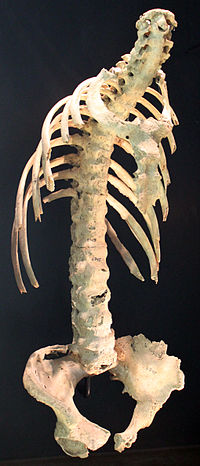
Photo from wikipedia
Chronic inflammatory conditions of the genital tract are still unsatisfactorily recognised in the workup of male infertility due to inappropriate definitions and inconsistent diagnostic criteria. The most popular term used… Click to show full abstract
Chronic inflammatory conditions of the genital tract are still unsatisfactorily recognised in the workup of male infertility due to inappropriate definitions and inconsistent diagnostic criteria. The most popular term used for description of both, infections and inflammation in the genital tract is MAGI (male accessory gland infection). In asymptomatic patients, the diagnosis is primarily based on leucocytospermia (i.e., more than 1 million peroxidase‐positive leucocytes per ml ejaculate), although ongoing infections should be identified and distinguished from post‐infectious or non‐infectious inflammatory disease. In addition to alterations of the basic semen parameters, sperm functions —and DNA integrity may be affected by chronic inflammation of the male genital tract. Despite considerable diagnostic drawbacks and a rather limited database concerning evidence‐based therapy, adequate management of affected patients appears mandatory. Antibiotic treatment aims at the eradication or reduction of pathogenic bacteria in the ejaculate. Available studies suggest, that NSAID are effective in chronic inflammatory conditions. Moreover, low‐dose corticosteroids, mast cell blockers, and other immune‐modulatory compounds as well as a sequential adjuvant treatment with antioxidants can be considered as therapeutic options.
Journal Title: Andrologia
Year Published: 2019
Link to full text (if available)
Share on Social Media: Sign Up to like & get
recommendations!